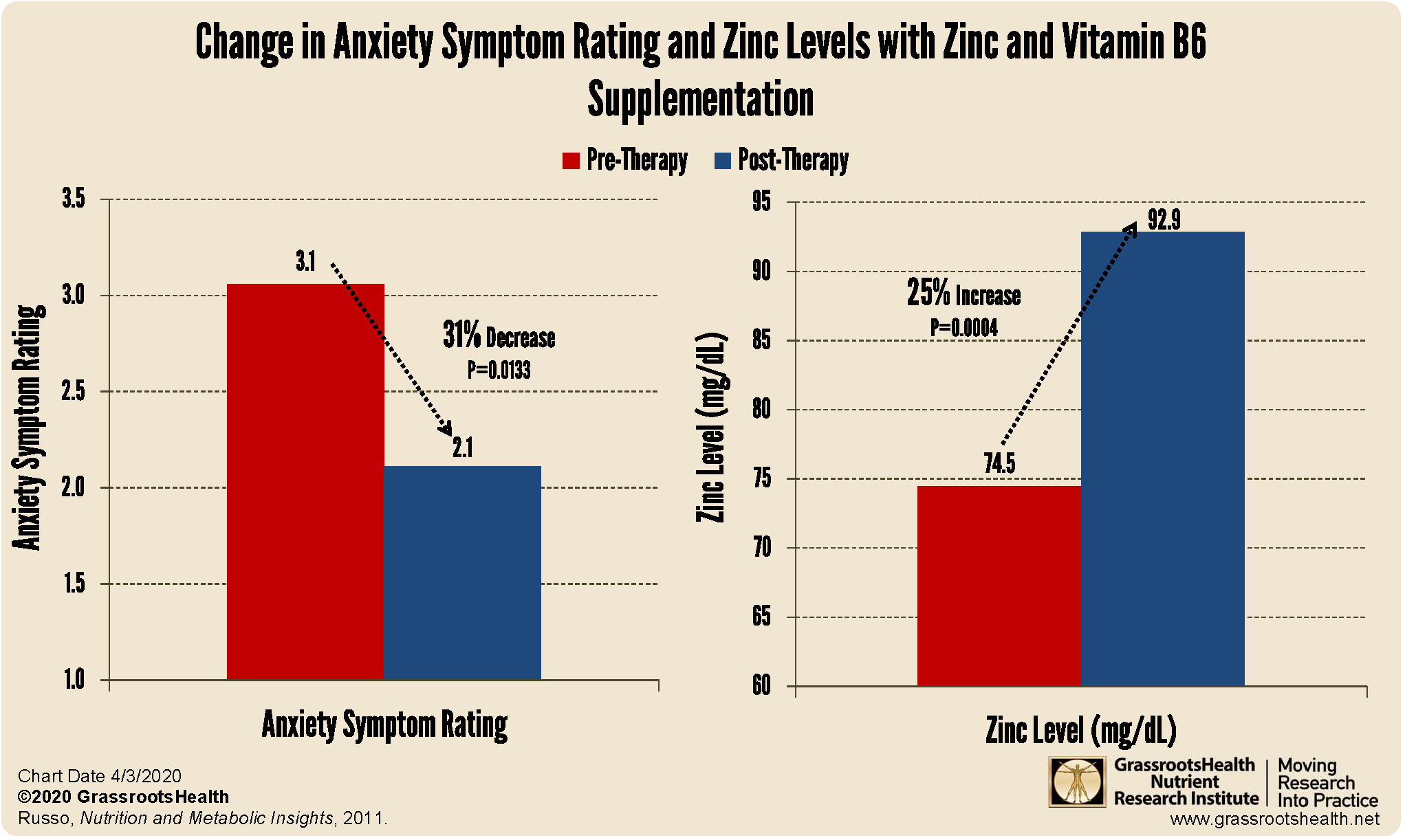Published on April 5, 2022
Study finds increasing zinc levels among participants diagnosed with anxiety was associated with a 31% decrease in anxiety rating
Key Points
- Zinc has protective effects against DNA damage and oxidative stress, which have also been correlated with anxiety; prolonged deficiency of zinc has been shown to cause emotional instability, irritability, and depression
- A study found significantly higher levels of copper and copper:zinc ratio, as well as lower levels of zinc, among those diagnosed with anxiety
- 8 weeks of zinc and vitamin B-6 therapy was given to 20 of the 38 anxiety patients; post-treatment levels of zinc were found to normalize, leading to a decrease in the copper:zinc ratio as well as a significant improvement in anxiety symptoms

Anxiety disorders are the most common class of all psychiatric, affecting roughly 1/3 of the US population and about 1/8 of the worldwide population. Anxiety symptoms can include irritability and anger, depression, the lack of ability to focus or concentrate, racing thoughts, trouble sleeping, light sensitivity, migraines, OCD or obsessive behavior, intrusive thoughts, restlessness, disorganization, and panic attacks.
Studies have shown a relationship between magnesium and anxiety and depression as well as omega-3 fatty acids; zinc and copper are two other essential nutrients that may play a role.
How could zinc affect anxiety?
Zinc has been labeled as one of the most important trace elements in the body, and is an essential nutrient necessary for the proper function of many physiological processes, including neurological functioning. Previous studies have found an increased incidence of zinc deficiency among individuals with anxiety and depression. Zinc has protective effects against DNA damage and oxidative stress, which have also been correlated with anxiety. Prolonged deficiency of zinc has been shown to cause emotional instability, irritability, and depression.
Correlations between anxiety and levels of zinc, copper, and the copper:zinc ratio
A study by A.J. Russo, published in Nutrition and Metabolic Insights, looked at the relationship of zinc and copper to anxiety symptoms. In this study, serum levels of zinc, copper, and copper:zinc ratio were measured in a group of 38 females diagnosed with anxiety and compared to a group of 16 female controls, both pre-treatment and post-treatment. The severity of anxiety symptoms was also tracked.
Significantly higher levels of copper and copper:zinc ratio, as well as lower levels of zinc, were found in those with anxiety.
A minimum of 8 weeks of zinc and vitamin B-6 therapy was given to 20 of the 38 anxiety patients. While copper levels did not decrease significantly, post-treatment levels of zinc were found to normalize, leading to a decrease in the copper:zinc ratio as well as a significant improvement in anxiety symptoms.
The chart above shows the change in anxiety symptom rating and serum zinc levels for those participants diagnosed with anxiety who were given 8 weeks of zinc and vitamin B6 supplementation. As can be seen, from pre-treatment to post-treatment measurements, anxiety symptom ratings decreased by 31% (p=0.0133) while zinc serum levels increased by 25% (p=0.0004).
Could your zinc and copper levels be contributing to anxiety?
Are you struggling with anxiety symptoms? Do you know your magnesium, zinc, copper, and copper:zinc ratio levels? Make sure you know the status of these important elements and others by adding the Magnesium Plus Elements blood spot test to your vitamin D kit, and see if changes in your diet and supplementation could improve your element status and health outcomes.
Make Sure You Are Getting Enough of these Essential Nutrients!
 Having and maintaining healthy vitamin D levels and other nutrient levels can help improve your health now and for your future. Choose which additional nutrients to measure, such as your omega-3s and essential minerals including magnesium and zinc, by creating your custom home test kit today. Take steps to improve the status of each of these measurements to benefit your overall health. With measurement you can then determine how much is needed and steps to achieve your goals. You can also track your own intakes, symptoms and results to see what works best for YOU.
Having and maintaining healthy vitamin D levels and other nutrient levels can help improve your health now and for your future. Choose which additional nutrients to measure, such as your omega-3s and essential minerals including magnesium and zinc, by creating your custom home test kit today. Take steps to improve the status of each of these measurements to benefit your overall health. With measurement you can then determine how much is needed and steps to achieve your goals. You can also track your own intakes, symptoms and results to see what works best for YOU.
Enroll in D*action and Test Your Levels Today!






